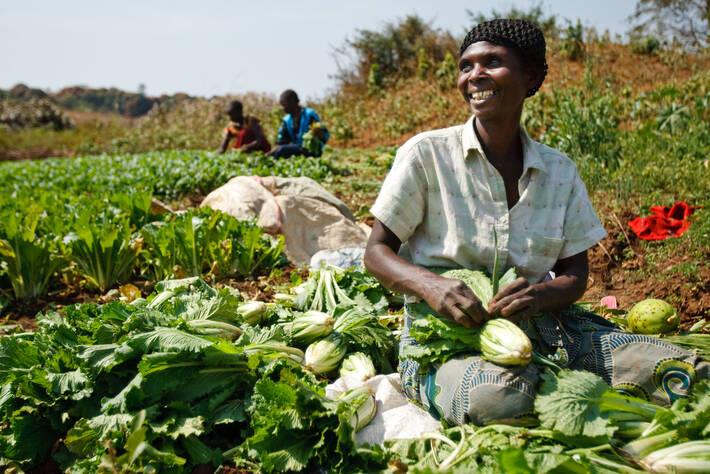Rethinking development and climate finance to transform agrifood systems

At an ECOSOC Forum on Financing for Development side event, FAO Chief Economist, Máximo Torero, underscored the importance of leveraging new approaches to financing efficient, sustainable, inclusive and resilient agrifood systems.
As part of FAO’s engagement at the UN Economic and Social Council (ECOSOC) 2022 Forum on Financing for Development, yesterday’s side event ‘Finance for Agrifood Systems Transformation in the context of the Addis Ababa Action Agenda’ heard FAO Chief Economist, Máximo Torero, speak on unlocking and rethinking development and climate finance to transform agrifood systems and drive forward the 2030 Agenda.
Yesterday’s event helped foster discussions around innovative, inclusive, and green finance and its importance in transforming the way we produce and consume food, including through the Food Finance Architecture and under the wider Addis Ababa Action Agenda. To this end, the FAO Chief Economist touched on the role of finance in boosting the resilience of our agrifood systems, with special attention to where the poorest and most food insecure live: rural and agriculture-dependent communities.
“Fulfilling the 2030 Agenda depends crucially on progress in rural areas, which is where most of the poor and hungry live,” Torero said, adding that “sustainable and equitable agrifood systems are crucial to eradicate hunger.”
Agrifood systems are underperforming: need to rethink how agriculture is financed
Latest world hunger and nutrition figures show that between 720 and 811 million people in the world face hunger, while around 3 billion people lack access to healthy diets. The 2021 UN Food Systems Summit committed stakeholders to work together to transform agrifood systems, a feat requiring significant additional investment, estimated at USD 300-400 billion more per year. Repurposing certain subsidies and agricultural support policies, Torero explained, can already reorient some USD 540 billion.
The current agrifood system architecture generates at least USD 12 trillion in hidden social, environmental, and economic costs each year, calling for more inclusive finance strategies, starting with addressing structural inequalities in access to finance among those who need it the most, and mobilizing private finance from an equity and sustainability optic. Transforming agrifood systems also stand to help unlock some USD 4.4 trillion in new business opportunities every year moving forward.
“Despite compelling needs to scale up green investments and climate-smart practices, access to green and sustainable finance has proven difficult,” Torero remarked, highlighting how, currently, “only 1.7 percent of global climate finance goes to smallholder farmers, despite them being particularly exposed to the effects of climate change.”
Aligning investment incentives with desired policy outcomes
Our agrifood systems are facing important shocks, from the impacts of COVID-19 and associated mitigation measures, to increasingly recurring weather extremes, and the impacts to global food markets from the war in Ukraine. Adding to these shocks is the underfinancing of agriculture. Those most impacted by low levels of financing and limited access to it are predominantly small-scale farmers and actors along agrifood value chains in developing countries.
Small-scale farmer access to finance is crucial to increase access to food, enabling them to invest in their livelihoods and wellbeing.
“If we want to reduce poverty, contribute to healthy diets, promote One Health, and we want to reduce inequalities and have decent employment and environmental sustainability, we need to focus on agriculture, and therefore, on rural areas,” Torero said.
Adopting a One Health approach to agrifood systems transformation
Earlier this week, the Director of the FAO Liaison Office with the United Nations in New York, QU Guangzhou, spoke on behalf of FAO during the informal meeting 'Financing the SDGs by increasing fiscal space for an inclusive and sustainable recovery,' highlighting the importance of adopting a One Health approach in pandemic preparedness investments.
Agrifood systems: a catalytic tool to deliver on the 2030 Agenda
Adding to the discussion and exchange of ideas from yesterday's side event, the Chief Economist delivered a video message today as part of the Forum's general debate session. He touched on why investing in agrifood systems is not only a pathway towards a Zero Hunger world, but also a driver of the broader 2030 Agenda during this Decade of Action.
"Food systems transformation is one of the most powerful tools to achieve the 2030 Agenda," he said, pointing out that agriculture accounts for one-third of global gross-domestic product, and that the food and agriculture sector provides livelihoods for 40 percent of today’s global population.
"A high-performing and inclusive agrifood system is a solution to tackle world hunger; accelerate recovery from the COVID-19 pandemic; and create resilient jobs and reverse the devastating climate change and loss of natural resources," Torero added.
Related links
- Watch the recording from yesterday's side event and revisit the presentation by the FAO Chief Economist here.
- More on FAO’s finance and investment solutions for agrifood systems and investing for results.
- Access the '2022 Financing for Sustainable Development Report: Bridging the Finance Divide’ here.
